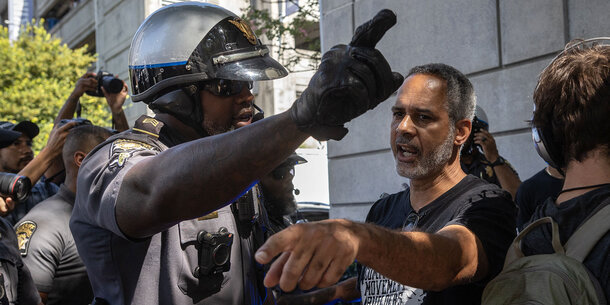Meta is suing a social media surveillance company that offers its services to police with promises that it can determine whether someone might be dangerous based on information collected from social media. The lawsuit alleges that Voyager Labs violated Facebook’s terms of service by creating more than 38,000 fake accounts to scrape information — including posts, likes, friend lists, photos, and comments — from more than 600,000 Facebook users. Those users included employees of nonprofits, news organizations, and government agencies, along with parents, retirees, and union members.
The charges raise concerns about who ends up using this information, and to what end. In light of repeated reports of police turning to online monitoring to target people of color and First Amendment–protected activities, the accusations against Voyager are a reminder that when law enforcement employs tools to facilitate unbridled social media surveillance, civil rights and civil liberties are at risk.
Voyager has strong ties to law enforcement. The company touts these connections on its website, and they were brought into stark relief by documents obtained through the Brennan Center’s freedom of information lawsuit against the Los Angeles Police Department. The documents, which Meta’s legal complaint draws on heavily, revealed that the LAPD tried out Voyager’s services for four months in 2019 to assist with both real-time intelligence and investigations. The materials offer a window into how the company’s technology can be used for law enforcement and national security purposes.
Some of Voyager’s marketing pitches to the LAPD, for instance, mirror the allegations in Meta’s lawsuit: one letter it sent the LAPD advertised its ability to provide “anonymous” “traceless” data collection from social media networks using “multiple proxies” to “reconstruct[] closed profiles based on publicly available information.” In layman’s terms, this appears to mean using secret accounts that cannot be attributed to police to draw inferences from public data that users may be trying to keep private, if not secret.
But the company doesn’t stop at clandestine data collection. Rather, it claims it can use social media information to determine whether a person poses a potential risk to public safety. It bases this in part on assessing how much “passion” a person displays about a given idea. In one case study, it suggested that simply posting about “pride in . . . Arab heritage” can indicate dangerous “extremism.” Voyager also offers clients a Friendship Report — a “fully exportable ‘deep dive’” on the connections between users, such as who their mutual friends are, when their connection was established, and how frequently they interact.
Beyond the obvious discriminatory implications of flagging people as potential criminals based on their religious beliefs, ethnicity, or online associations, data scientists have repeatedly refuted the accuracy of these predictions. Claims that artificial intelligence can be used to gauge someone’s criminal intent have been deemed unscientific, and relying on this kind of pseudoscience to conduct police investigations can lead to real consequences for individuals who wind up in gang databases, forced out of a job, or even on trial based on flimsy digital evidence that is notoriously easy to misinterpret.
Of course, the data these companies gather is publicly available on social media platforms. Still, it is hardly the same data that police officers and other individuals could access on their own. The services offered by Voyager and others in the social media mining ecosystem allow their clients to collect and crunch far more information at a much higher speed and much lower cost than any one person could accomplish by manually checking individual profiles. And when the client is the police, the stakes are far higher, with risks including the targeting of marginalized communities and constitutionally protected activities, invasions of privacy, and a lack of public transparency. When these tools supercharge law enforcement’s access to online data, they may also supercharge the associated dangers.
Notably, the LAPD is far from the only law enforcement agency using questionable social media monitoring technologies. Last year, the FBI contracted with Babel Street, which similarly promised to collect personal information using fake accounts and analyzing online relationships — the same activities for which Meta is now suing Voyager. Given that the Brennan Center has identified over half a dozen other surveillance-for-hire companies that have either pitched their services to or contracted with law enforcement agencies, the risks can’t be ignored.
It is impossible to know when (or if) Meta’s lawsuit will uncover more information or force changes at Voyager headquarters. In the meantime, law enforcement agencies should narrowly tailor their use of social media so as not to undermine civil rights and civil liberties. And they must operate under publicly accessible, binding policies that ensure social media is not used to discriminate or violate people’s rights.
The Brennan Center will continue to pursue our pending public records requests to shine a light on police departments’ use of social media information. Transparency and accountability are vital to ensuring that law enforcement truly serves the public it is sworn to protect.







